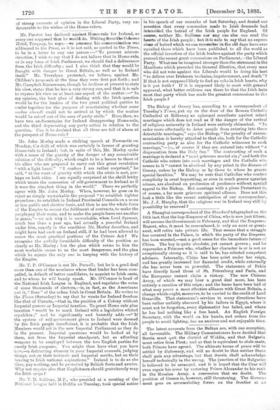Mr. T. P. O'Connor is not Mr. Parnell; but he
is a good deal more than one of the nominees whom that leader has been com- pelled, in default of better candidates, to appoint to Irish seats, and to whom he will barely speak. Mr. O'Connor is head of the National Irish League in England, and regulates the votes of some thousands of electors,—is, in fact, as the Americans put it, "Boss" of the urban Irish in Great Britain. He writes to the Times (Saturday) to say that he wants for Ireland freedom like that of Canada,—that is, the position of a Colony without Imperial powers or Imperial taxation. To grant Home rule plus taxation "would be to mock Ireland with a legislative whited sepulchre ;" and he significantly and honestly adds :—" If the system of self.government given to Ireland were deemed by the Irish people insufficient, it is probable that the Irish Members would act in the new Imperial Parliament as they do in the present. Imperial questions would be looked at by them, not from the Imperial standpoint, but as affording weapons to be employed between the two English parties for purely Irish purposes. You might then have what you have now,—a distracting element in your Imperial counsels, judging things, not on their intrinsic and Imperial merits, but on their bearing to Irish national aspirations." Ireland is to do as she likes, pay nothing, and be protected by British fleets and armies. Why not require also that Englishmen should gratuitously reap the Irish crops ?


































 Previous page
Previous page